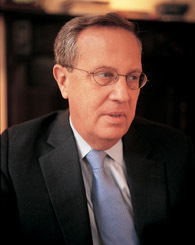 loading
loading
Q&A: Rick LevinWhy science is good for the economyAn interview with Yale president Richard Levin ’74PhD  Mark OstowView full imageY: Yale received over $100 million of stimulus funding for science and medical research. What makes you concerned now about federal science funding? L: We have a very large federal budget deficit. And one of the ways the president has proposed to close it is to freeze the so-called discretionary part of the budget, which means the agency budgets. So the prospects for the next few years for the National Institutes of Health, National Science Foundation, and Department of Energy, which provides funding for the defense research budget, would be dim. The worry is that after this big spurt we would go back to baseline and not grow for a few years. This is a worry not just for Yale, but for the whole research community, and indeed the future of the country. If we’re going to have long-term robust economic growth again, keeping research funding flowing is quite important. You need a steady stream of research dollars to generate new ideas that are going to create new industries and new businesses. We know from experience that cycles of robust growth and then decline are not good for innovation. It’s much better to have a predictable rate of increase. One of the things I have advocated in Washington is regularizing research funding. Instead of year-to-year decision-making, we should keep the ratio of R&D expenditures to GDP constant. This would imply, over the long term, steady growth at a rate of inflation plus 2 or 3 percent. Y: We’ve previously discussed your economics research on how basic science affects a country’s economy. You predicted, during Japan’s economic boom, that the boom would not last because Japan wasn’t investing enough in basic science. L: Yes, it was a combination of not enough funds devoted to basic science and a noncompetitive process of awarding those funds. Here in the United States, some 80 percent of science funds are allocated on a highly competitive, peer-review basis. Our system has kept us at the forefront of electronics, communications technology, and biotech. The president’s Council of Advisers on Science and Technology, on which I serve, issued in March a report on the nation’s progress in nanotechnology. The assessment by scientists and businesspeople was that with strong government funding over the last decade, we are way ahead in nanotechnology. Others are spending more now and starting to close the gap—China especially, but also the European Union—but we’re still substantially ahead in total funding, total patents, total products commercialized, and every other measurable category. This is the only way America can continue to be the leading economy in the world, in my opinion. Our labor costs are too high to lead in manufacturing products with mature technologies. We have to maintain our lead through innovation. Y: On a related issue, you have long been promoting changes to the law governing patents. What’s the status of that bill? L: A bill has passed the House a couple of times in various versions but not the Senate. But it’s now actively in play and seems much more likely to pass this year. This effort goes back to a National Academy of Sciences panel that I chaired from 2001 to 2004, which recommended changes in U.S. patent law, both to reduce expensive litigation and bring it into harmony with international standards. For example, in the U.S., if there are competing claims, priority goes to the first person to invent the device. In the rest of the world, the patent goes to the first inventor to file a patent claim. The U.S. process is completely subjective. You may have to go through weeks and weeks of testimony to figure out who actually had the idea first. That’s expensive and creates a lot of uncertainty. So we recommended that we do what the rest of the world does and give priority to the person who gets to the patent office first. It saves millions of dollars and gives the process clarity. And there are other subjective elements in U.S. patent law that convert virtually all infringement litigation into a costly fishing expedition about whether the inventor defrauded the patent office and whether the defendant “willfully” infringed the patent. Y: What’s the status on international student visas to the United States? This has been a big issue for you. L: There’s been considerable improvement in the time and burden facing students seeking visas to come and study. But we’ve made no progress on another serious problem: what happens to talented students who want to work in this country after they graduate. We have a very limited number of visas for well-trained graduates to get jobs and get on track to become permanent residents. For years Silicon Valley businesses and financial service businesses have been claiming that this is a very costly restriction on the pool of talent that could be available to us. Years ago I coined the phrase “Let’s staple the green card to the graduate diploma”—subject to appropriate security screening. But increasing the number of visas for highly educated graduates of U.S. universities has been hung up in the failed effort to achieve comprehensive immigration reform. I think it’s urgent to separate these issues. Despite the current levels of unemployment, there have been persistent shortages of people at high skill levels, particularly in IT industries. We are depriving ourselves of a lot of talent. Engineers who are trained here are going home—while they could be working here, strengthening our economy.
The comment period has expired.
|
|